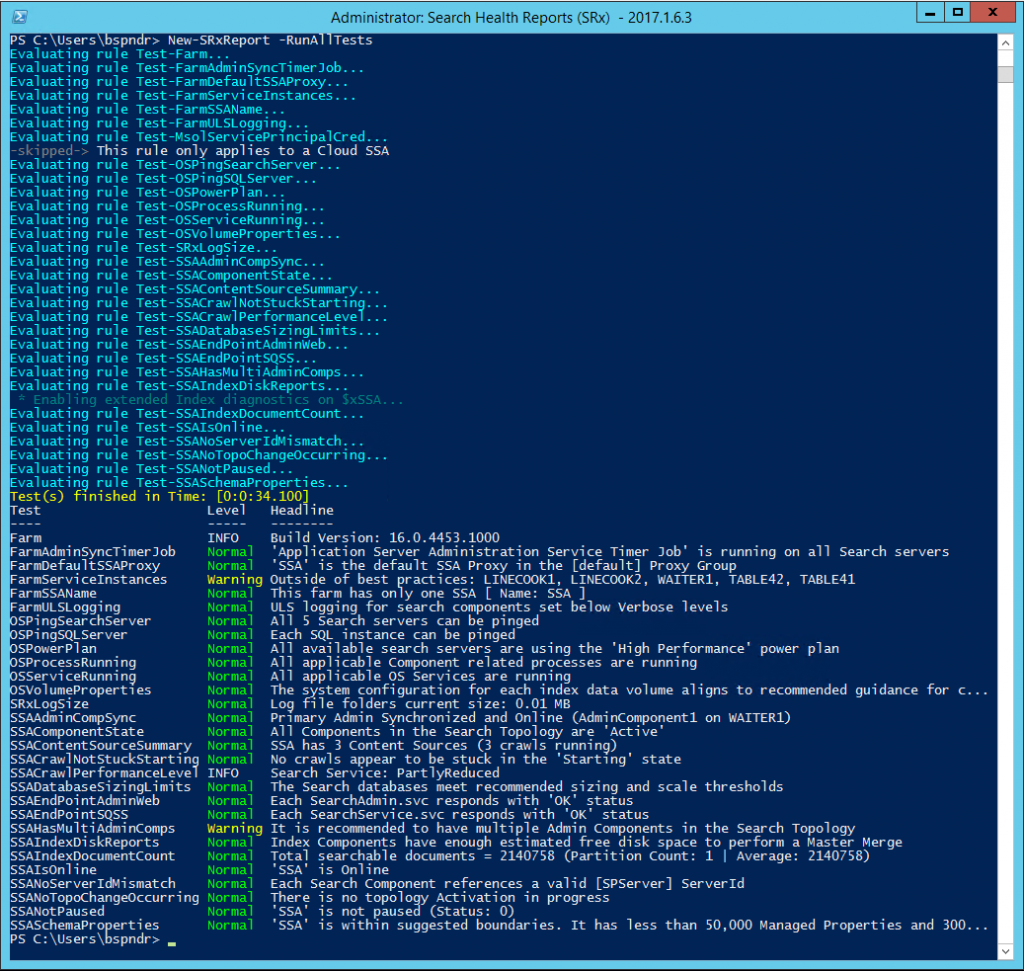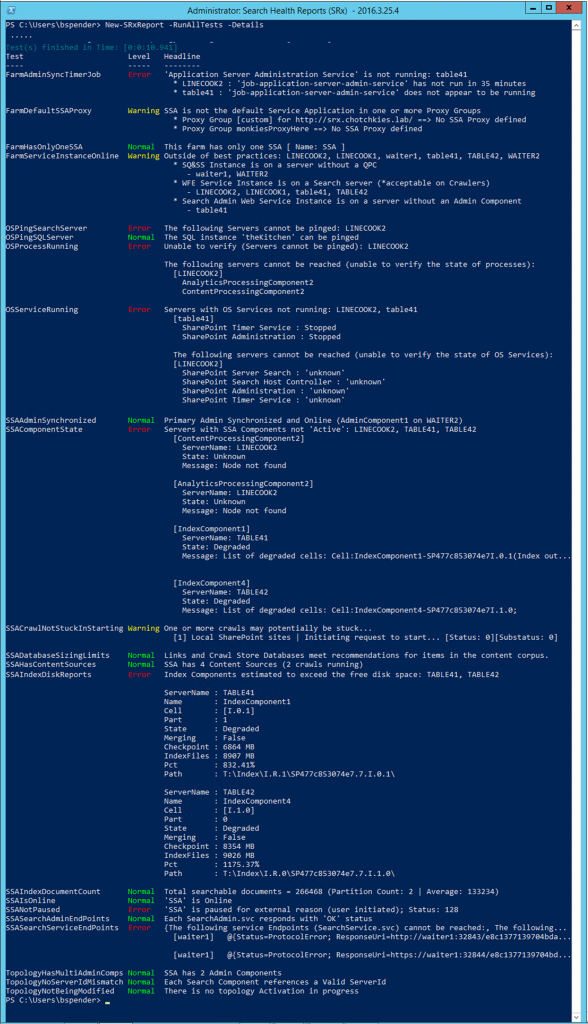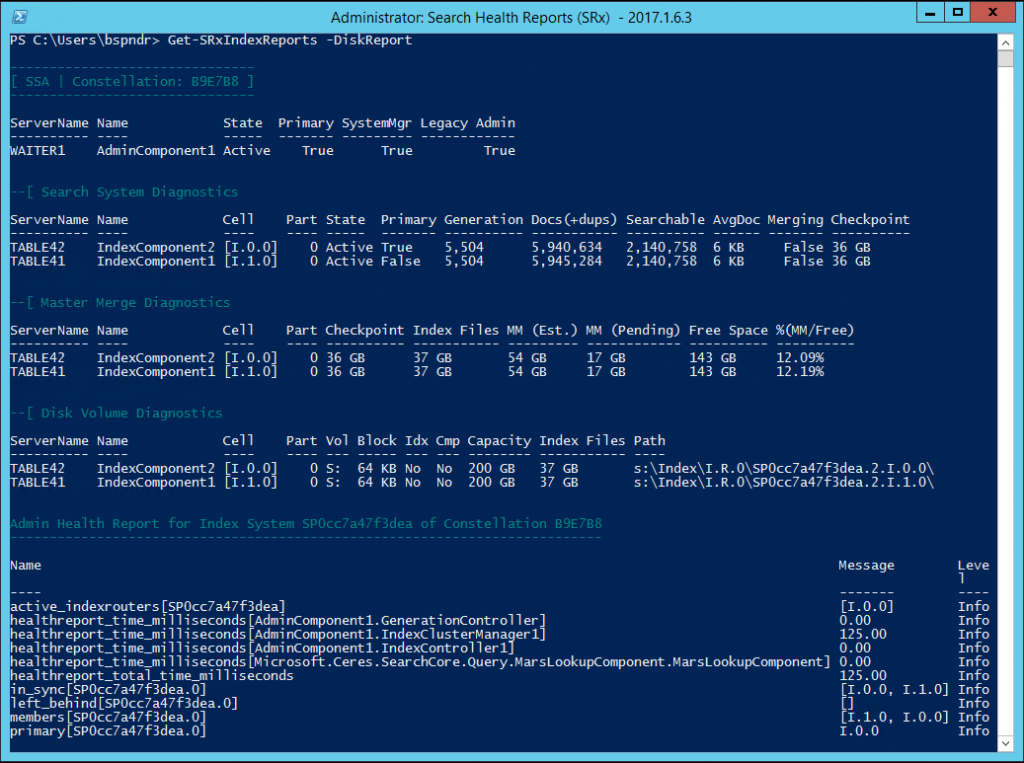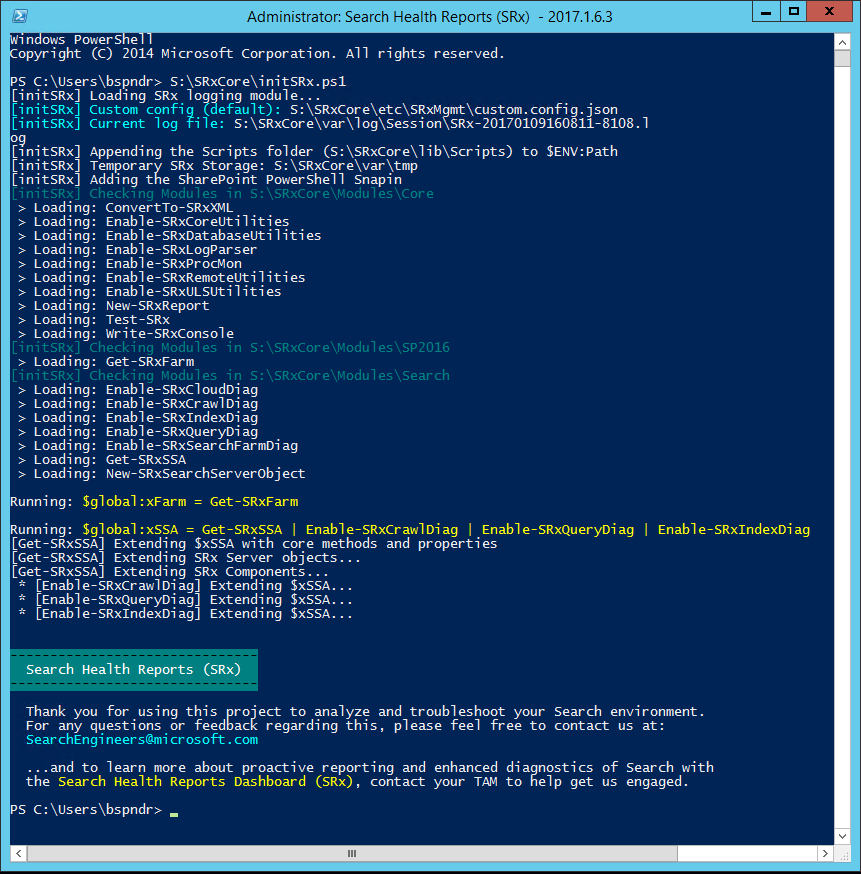Announcing the Search Health Reports (SRx) for SharePoint Search Diagnostics
![]() Brought to you by SearchEngineers@microsoft.com, the Search Health Reports (SRx) is a PowerShell-driven tool for surfacing complex diagnostics for SharePoint Search through new multifaceted reports. The SRx includes a battery of tests that leverage a customized SSA object extended with contextual data from many disparate sources.
Brought to you by SearchEngineers@microsoft.com, the Search Health Reports (SRx) is a PowerShell-driven tool for surfacing complex diagnostics for SharePoint Search through new multifaceted reports. The SRx includes a battery of tests that leverage a customized SSA object extended with contextual data from many disparate sources.
Our goal with this project is straightforward – empower users to troubleshoot Search more effectively so they can focus on solving business problems using Search.
Getting Started
First, download the SRxCore.zip from TechNet Gallery to your SharePoint Search Farm and unzip the files on a SharePoint Server. Then, initialize the SRx environment by simply running the .\initSRx.ps1 script (which exists in the root of the unzipped SRx folder) as demonstrated in the screen shot below:
This initialization script loads the custom PowerShell modules and creates a globally scoped $xSSA, an extended Search Service Application object with many custom properties and methods.
| Worth noting: The SRx does not persist after closing a PowerShell window, so each time you open a new PowerShell window, start by running .\initSRx.ps1 to initialize the SRx and you'll be good to go from there. |
Generating Test Results
[UPDATE 3/25/2016] For a summary on each test, please refer to the following post: Search Health Reports (SRx) - Summary for each 'Test'
From an initialized environment, you can then run a report including all of the tests with the following command:
New-SRxReport -RunAllTests 
As seen above, this battery of tests verifies that applicable servers can be pinged, component-related processes and services are running, component states are all 'Active', internal Search WCF EndPoints can be browsed, Index components have sufficient space to complete a Master Merges, the Legacy Admin is synchronized with the Admin Component, and more.
When running this set of tests, you can also output more details about the test results by adding the Details flag, such as (and this is also an example of handling when things go bad):
New-SRxReport -RunAllTests -Details 
The SRx also extends and replaces my previously published Indexer Reports, which you can generate in the SRx using the following:
$xSSA | Get-SRxIndexReports -DiskReport 
----
Looking Forward…
As Search PFEs, we are working with several of our dedicated customers to build upon the SRx Core by developing the Search Health Reports Dashboard (SRx) , which entails a custom SharePoint hosted site collection for rendering diagnostic gauges, KPIs, and proactive reporting. Over the last few months, this project significantly matured with expanding functionality and robustness – for that , a giant thank you goes out for the heavy lifting from Eric Dixon, Brent Groom, and Russ Maxwell.
Over the coming weeks, expect to see many more SRx related posts here (SharePoint Strategery), on SharePoint Brew (Russ Maxwell), and on Eric Dixon's Search Blog …all of which roll up to our team blog (On Search). In these coming posts, anticipate more details on individual tests, announcements of new functionality, and recordings that demonstrate advanced usage (*including sneak peeks of the SRx Dashboard). Finally, we'll continue to update the SRx Core on TechNet Gallery with the latest enhancements .
For any questions or feedback regarding this, please feel free to contact us at:
SearchEngineers@microsoft.com
...and to learn more about the Search Health Reports Dashboard (SRx) , contact your TAM to help get us engaged.
---
And the legalese:
Disclaimer: As the "Search Engineers", we are a group of Microsoft PFEs focused primarily on SharePoint Search. We released the Search Health Reports (SRx) to help others get more out of Search, but the SRx should not be considered an official product . ALL information in this blog is provided "AS IS" with no warranties and confers no rights. This blog does not represent the thoughts, intentions, plans or strategies of my employer. All content is solely my opinion and provided with a best effort to be based in reality.
All examples, code samples, demonstrations, or anything resembling a “how-to” are provided "AS IS" without warranty of any kind, either express or implied, including but not limited to the implied warranties of merchantability and/or fitness for a particular purpose. Inappropriate comments will be deleted at the authors discretion. And yes, the spelling of strategery was intentional.
Comments
Anonymous
February 02, 2016
Thanx a lot for this, unfortunately the Ping-SQLIO-Tests cannot handle SQL-Aliases, so it reports that the SQL-Servers are not pingable, because it pings the alias.Anonymous
February 02, 2016
This is pure brilliance - thank you ! Looking forward to testing this out.Anonymous
February 02, 2016
Thank you for checking this out and the feedback! - I'll see what we can do on the SQL Aliases... And in the meantime, if you want to avoid that test, you can simply rename the .TestTest-[whatever].ps1 with a .txt file extension (and the "RunAllTests" will skip that one. Appreciated, --BrianAnonymous
February 03, 2016
The comment has been removedAnonymous
February 03, 2016
Hi Brian, I've included the resolution of the SQL Aliases, pasting the complete script, our changes can be found between "Begin of custom code" and "End of custom code". It has been successfully tested:
make sure the the $xSSA has been instantiated
if(-not $xSSA._hasSRx) { throw [System.NullReferenceException] "This test requires a valid `$xSSA" }
$xSSA will be in scope
$ruleObject = New-Object PSObject $ruleObject | Add-Member Name "Test-OSPingSQLServer" $ruleObject | Add-Member ExpectedValue "0" $ruleObject | Add-Member Category @("infrastructure"); $ruleObject | Add-Member ActualValue $( $unreachable = $(New-Object System.Collections.ArrayList) $dbServerInstances = (Get-SPDatabase).Server | foreach {$_.address} | SELECT -Unique <# Begin of custom code #> #Get all aliases $allAliases=Get-ItemProperty -Path 'HKLM:SOFTWAREMicrosoftMSSQLServerClientConnectTo' write-host $allAliases $dbServerInstancesFromAlias=@(); #Resolv the aliases foreach($dbServerInstance in $dbServerInstances){ $value=$xSSA.GetServer($dbServerInstance).Name; $resolvedAlias=$allAliases.$value if($resolvedAlias){ #get the Instance-Name $resolvedAlias=$resolvedAlias.Substring($resolvedAlias.IndexOf(",")+1) #remove the instances, so that we can ping the servers $resolvedAlias=$resolvedAlias.Substring(0,$resolvedAlias.IndexOf("")); write-host "Resolved $($dbServerInstance) to $($resolvedAlias)" #Fill the array with the servernames, $dbServerInstancesFromAlias+=$resolvedAlias; } } if($dbServerInstancesFromAlias.Count -gt 0){ $dbServerInstances=$dbServerInstancesFromAlias; } <# End of custom code #> $dbServerInstances | foreach { $serverName = $ if (-not $xSSA.GetServer($serverName).canPing()) { $unreachable.Add($serverName) | Out-Null } } if ($dbServerInstances.Count -gt 0) { if ($unreachable.count -eq 0) {$unreachable = 0} $unreachable } else { 'unknown' } #something else is wrong if no instances are reported ); $ruleObject | Add-Member Success $($ruleObject.ActualValue -eq $ruleObject.ExpectedValue) $ruleObject | Add-Member Message $(if($ruleObject.Success){ @{ level = "Normal"; headline = "Each SQL instance can be pinged"; } } else { @{ level = $( if ($ruleObject.ActualValue -ieq 'unknown') { "Warning" } else { "Error" } ); headline = $( if ($ruleObject.ActualValue -ieq 'unknown') { "Unexpected : No SQL Server instances could be identified for this SSA" } else { $outString = "The following SQL Servers cannot be pinged: " $delim = "" $ruleObject.ActualValue | foreach { $outString += $delim + $ $delim = ", " } } $outString ); } }) #And then just return the object as the last step… $ruleObject
Anonymous
February 04, 2016
The comment has been removedAnonymous
February 08, 2016
It would be nice to have brief description on each one. Critical or not critical for example.Anonymous
February 09, 2016
Hi John - completely agree ...and that is the next blog post coming (there will be a TechNet wiki article for that lists each out and gives basic summary of each... and a blog post giving even more context) ...and we're planning on writing even more detailed documentation for each test, too. Appreciated!Anonymous
February 17, 2016
I want to understand where do i need to change in order to get the result in a custom csv when doing "New-SRxReport -RunAllTests -Details" I lost the flow of the script after Write-Srx . Cold you please give me insight. This is a wonderful script .A real lifesaver, if there ever was one :)Anonymous
February 17, 2016
Hi Rohit, I think you're looking for something like this: Test-SRx -All | Export-Csv c:tempsrx.csv Note that the data and detail property values, when they are objects, won't get fully expanded in the csv file.Anonymous
February 24, 2016
Thanks Eric. I want to extract the data from "New-SRxReport -RunAllTests" which shows status as Normal/Failed into an csv/HTML which can be sent in an email body. I am not able to extract this data using export CSVAnonymous
February 25, 2016
Are there any plans to put Search Health info into the SPO Admin Center?Anonymous
April 20, 2017
Are the creation of dashboards something you have released to everyone at this time?- Anonymous
June 09, 2017
Hi John,The full dashboard is offered as a Premier service. If you have a Microsoft TAM, please reach out to them and they can help initiate the Axis request for getting the full Search Health Reports (SRx) Dashboard. I hope that helps,--Brian
- Anonymous
